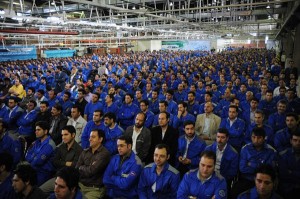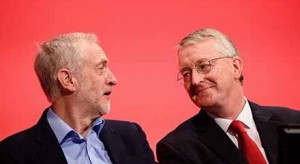As reports continue to come from Iraq indicating advances by the country’s armed forces on Fallujah, held by Islamic State, a number of international organisations, including the United Nations, are echoing earlier warning from Iraq’s main Shia cleric, ayatollah Ali al-Sistani, that the lives of the town’s 50,000 inhabitants are in mortal danger.
Al Jazeera’s Omar al-Saleh, reporting from Erbil in northern Iraq, described the situation in Fallujah as dire: “There is a lack of medicine and food. They are caught in the fighting between Isil and Iraqi forces.”1 And, according to UN agencies, Fallujah civilians were starving to death – some have been killed for refusing to fight for IS, while others were being used as “human shields”. Melissa Fleming, a spokeswoman for the UN High Commissioner for Refugees, said: “We have dramatic reports of the increase of the number of executions of men and older boys, refusing to fight on behalf of Isil.”
With Tony Blair about to be exonerated by the Chilcot enquiry for his criminal part in the invasion of Iraq, it is time to remind ourselves why we are where we are, with the continuing civil war in Iraq and the rise of IS. In the words of lieutenant-general Michael Flynn, the former head of the Defence Intelligence Agency, the Bush-Blair Iraq war was a “tremendous blunder” that “helped to create Islamic State”. According to Flynn, “As brutal as Saddam Hussein was, it was a mistake to just eliminate him.” In fact the “historic lesson” is that it was “a strategic failure to go into Iraq”.2
Fallujah hit the headlines in 2004, when four American private military contractors were ambushed and killed in the city, leading to what became known as Operation Vigilant Resolve and the subsequent battle for control, lasting most of the year. The US-led Fallujah offensive of November 2004 was documented by Italian film-makers Sigfrido Ranucci and Maurizio Torrealta, who claimed that white phosphorus, a highly efficient smoke-producing agent (ironically not considered a chemical weapon), was being used by US troops against civilians.3 This was later confirmed by the journal Field Artillery in April 2005.
Anyone in their right mind will tell you that it was the atrocities committed by US and British troops in Fallujah (as well as the rest of Iraq) that helped the Iraqi al Qa’eda recruit those who wanted to resist the occupation, including previously secular Ba’athists, to what was to become Islamic State of Iraq and the Levant (Isil) and later IS.
Fallujah is important to IS, not just because of its proximity to the capital, Baghdad, but because it is the jihadist group’s birthplace. That is why, contrary to early predictions, the battle for Fallujah is turning out to be far more difficult than expected.
However, for the Iraqi regime regaining control of the oil-producing town of Mosul in the north remains a priority. Yet that battle has been left to the Iraqi Kurdish Regional Government, aided by US air strikes. The Zerevani special forces involved in that battle consist of 5,500 Kurdish Peshmerga, who are attempting to wrest control back from IS. Western reporters, including Sky News and CNN, have identified American and Canadian advisors in the front line, but no-one is claiming that the current fighting will lead to the recapture of the city, which had a population of over two million before IS took control.
Mosul is close to a number of smaller towns on the Nineveh plains, such as Qaraqosh. But these towns effectively no longer exist – their Christian inhabitants, who had lived there for centuries alongside Muslims, have been forced to flee from their birthplaces. And in another battle in western Anbar province, in and around the town of Heet, 40 Iraqi security forces were killed by IS, forcing a retreat.
All this is yet another sign of the contradictory US policy in the region. If the aim is to defeat IS, then the solution is obvious. Put pressure on Turkey and Saudi Arabia to impose economic and political sanctions against anyone financing or dealing with the jihadists.
Rivalries
However, for the time being the main battles are around Fallujah, where a visit by Iranian general Qasem Soleimani to encourage Shia al-Quds paramilitary forces fighting alongside the Iraqi army caused controversy, with Sunni politicians condemning the visit for fuelling sectarian tensions. Hamid al-Mutlaq, a Sunni member of the Iraqi parliament, told news agencies: “We are Iraqis and not Iranians … Would Turkish or Saudi advisors be welcomed to assist in the battle?”4 For his part, the MP for Fallujah, Salim Muttar al-Issawi, said: “Soleimani’s presence is suspicious and a cause for concern. He is absolutely not welcome in the area.”
All this was grist to the mill of Saudi foreign minister Adel al-Jubeir, who accused Iran of interfering in the internal affairs of other regional countries – not that Saudi Arabia itself would do such a thing, of course. Iran’s response came via the deputy head of the Iraqi volunteer forces, who stated that Soleimani’s presence followed a “request of the Baghdad government”.
So the battles in Iraq (as well as in Syria) are not just about control of Fallujah, Mosul, Heet, etc. They are part and parcel of the regional rivalry between Iran and Saudi Arabia, who are still fighting to fill the political vacuum left after Saddam Hussein’s downfall more than a decade ago. As I have pointed out many times, the current civil wars in the Middle East have little to do with ‘Sunni-Shia conflict’: they are part of this regional rivalry. Iran’s Islamic Republic, the unintended beneficiary of the Iraq war, continues to support the corrupt, sectarian government in Iraq, the brutal dictator in Damascus and its long-term allies in the Lebanese Hezbollah. Meanwhile, Islamic State would not survive for long if Saudi and Turkish financial and military support was ended. But that is unlikely, as long as the two main rivals of the Islamic Republic of Iran feel threatened by its ability to control what they consider to be a Shia belt stretching from Afghanistan to the Mediterranean (albeit with an Alawite strip in Syria).
IS’s revenge has come in the form of suicide bombings. Sadr City – a Shia suburb in eastern Baghdad, considered a stronghold of the cleric, Muqtada al-Sadr – has been one of the main targets and on May 17 a crowded market was hit and dozens were injured. Of course, Baghdad’s infamous ‘green zone’ – the government quarters inherited by the post-occupation administration – has been the scene of a number of protests by supporters of al-Sadr, who are campaigning against the corruption and incompetence in the government led by fellow Shias. However, according to the website Al monitor: The pulse of the Middle East, “IS has been seeking to provoke Shi’ite infighting in a bid to delay the liberation of the remaining areas under its control.”5
Shi’ite political parties have accused each other of initiating the bombings in Sadr City and other Baghdad suburbs. Al-Sadr himself has issued statements naming the current interior minister, Mohammed Salem al-Ghabban, as responsible for the previous suicide attack on May 11 and called on prime minister Haider al-Abadi to dismiss him – “or else the people will find a way to deal with him on their own …” In other words, al-Sadr is equating the Iraqi authorities and IS.
Throughout all this another, related, civil war is continuing in Syria and, of course, both Iran and IS are involved there too. News in late April was dominated by the discovery that the Islamic Republic had sent thousands of Hazara Afghan men (who are Shias) to fight alongside the Syrian regime’s army. They were born to Afghan refugee families in Iran and dispatched to Syria, courtesy of the Revolutionary Guards. Some of these ‘volunteers’ have subsequently deserted and joined Syrian refugees trying to seek asylum in Europe. According to BBC Persian service, these Afghans are fleeing the “multinational Shia Muslim militia – in effect a ‘Foreign Legion’ – that Iran has mobilised to support Syrian president Bashar al-Assad.”6
No-one is expecting much from the Chilcot enquiry. However, Tony Blair’s blatant denial of his part in the creation of the chaos in the Middle East shows that few have learnt any lessons from the invasion of Iraq. More worryingly, Hillary Clinton – who in private meetings with the Israeli lobby and rightwing Iranian exiles in the United States is allegedly promising regime change from above in Iran – is ready to repeat the same mistakes all over again, this time in Syria.
As the examples of Iraq and Libya show, overthrowing dictators is easy for imperialism. The problem is, what will replace them?
yassamine.mather@weeklyworker.co.uk
Notes
1. www.aljazeera.com/news/2016/05/iraqi-army-poised-fallujah-assault-isil-160530040140967.html.
2. www.spiegel.de/international/world/former-us-intelligence-chief-discusses-development-of-is-a-1065131.html.
3. www.democracynow.org/2005/11/8/u_s_broadcast_exclusive_fallujah_the.
4, http://in.reuters.com/article/mideast-crisis-iraq-iran-falluja-idINKCN0YJ0G7.
5. www.al-monitor.com/pulse/originals/2016/05/islamic-state-strategy-cause-infighting-among-iraqi-shiites.html.
6. www.bbc.co.uk/news/world-middle-east-36035095




 On December 2 the House of Commons voted by 397 to 223 in favour of UK air strikes in Syria. Under the leadership of Hilary Benn, shadow foreign secretary, there were 66 Labour MPs who took advantage of the free vote offered by Jeremy Corbyn and openly sided with the ill-considered imperialist operations in Syria – even 10 Conservatives rebelled, such were their worries. After his closing speech Benn was cheered and congratulated not only by the 67 pro-war Labour MPs, but by front-bench Tories, members of the Democratic Unionist Party and Liberal Democrats. He is the leader of their Labour Party.
On December 2 the House of Commons voted by 397 to 223 in favour of UK air strikes in Syria. Under the leadership of Hilary Benn, shadow foreign secretary, there were 66 Labour MPs who took advantage of the free vote offered by Jeremy Corbyn and openly sided with the ill-considered imperialist operations in Syria – even 10 Conservatives rebelled, such were their worries. After his closing speech Benn was cheered and congratulated not only by the 67 pro-war Labour MPs, but by front-bench Tories, members of the Democratic Unionist Party and Liberal Democrats. He is the leader of their Labour Party.